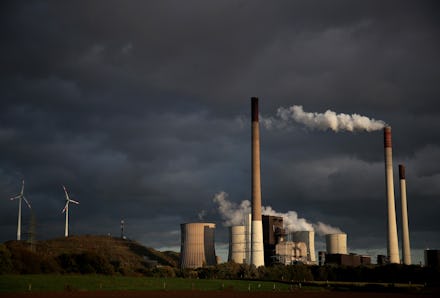Trump to roll back more environmental rules, this time to let coal plants pollute more

Since becoming president, Donald Trump has made it a point to try to undo every rule put forth by the Obama administration with the intention of protecting the environment. The latest example: Trump is planning to instruct the Environmental Protection Agency (EPA) to roll back protections put in place by the previous administration to limit pollution allowed from coal plants. According to the New York Times, the Trump administration will allow coal-fired power plants to release higher levels of toxins — including coal ash and heavy metals like arsenic, led and mercury — into water supplies.
The rules were part of an effort launched by the Obama administration in 2015 to protect water sources from contamination sourced from coal power plants. Those rules established stronger inspection protocols and monitoring requirements at coal plants and lowered what was considered to be acceptable levels of toxic effluent, better known as liquid waste. The Obama-era regulation also required coal plants to install technology that helped to protect nearby water supplies from contaminated coal ash. Those requirements will be getting eased back by Trump, according to the report, and "a significant number of power plants" will be exempted from meeting any of the requirements.
The reason for Trump's roll back of these laws is simple: he is heavily invested (emotionally, at least) in the success of fossil fuel power plants. He ran his 2016 presidential campaign on the promise that he would save coal plants. Upon becoming president, he set forth the America First Energy Plan, which touted plans to increase drilling for natural gas and mining for coal while doing away with "burdensome regulations" supposedly holding the industry back. He's largely made good on that promise. The New York Times has tracked more than 85 examples of completed or planned roll backs and repeals of environmental regulations carried out by the Trump administration. That includes repealing a rule that limited the amount of methane emissions allowed on public lands, loosening rules that restricted toxic emissions from industrial polluters and lifting a requirement on coal mine owners so they no longer have to prove that they can pay for clean up and any future pollution caused by their operations.
Rolling back rules on toxic waste from coal plants is a particularly odious and potentially dangerous decision. Without the protections in place, coal ash can effectively be freely released into water supplies, which can result in contamination of groundwater and eventually make its way into drinking water. Prior to the Obama rules implemented in 2015, there wasn't much data on this type of contamination. In 2018, because of the regulations, coal plants were compelled to data collected by the mandated groundwater monitoring technology. The results weren't pretty. According to Earth Justice, an environmental nonprofit, 91 percent of the 265 plants that reported data were contaminating groundwater with toxic substances at levels exceeding federal safety standards.
While rolling back these rules might be good for the health of the coal industry (even that is debatable, as coal plants are now more expensive than solar and wind alternatives for most of the world and are barely economically viable without being propped up by artificial incentives) it certainly isn't good for the health of humanity. Coal ash released into water supplies can contain toxic pollutants including arsenic, boron, cadmium, chromium, lead, radium, selenium and others, according to Earth Justice. Those toxins have been linked to all sorts of negative health outcomes. The EPA has warned that people living near coal ash disposal sites are at an increased risk of cancer and other life-threatening illnesses. The agency estimates that people who drink arsenic-contaminated water have as much as a one in 50 chance of getting cancer. Coal ash toxins have also been linked to heart disease, reproductive failures, strokes, and can harm or stunt human development, making it particularly dangerous to children.
By rolling back the protections put in place to protect people from these devastating health effects, Trump has made clear where his values lie. Protecting a dying industry that makes up a small fraction of the economy and can easily be replaced by cleaner and safer alternatives is more important than protecting the livelihoods of the people living near these dangerous pollution factories. Saving coal, as Trump has claimed to do, comes with a cost. In this case, it may be lives.